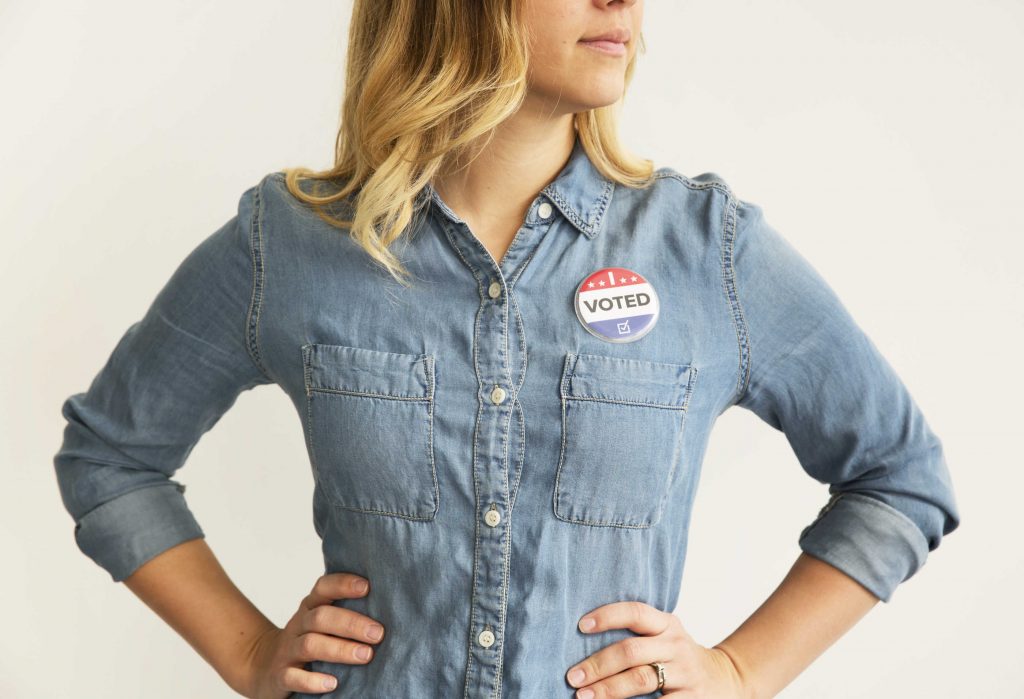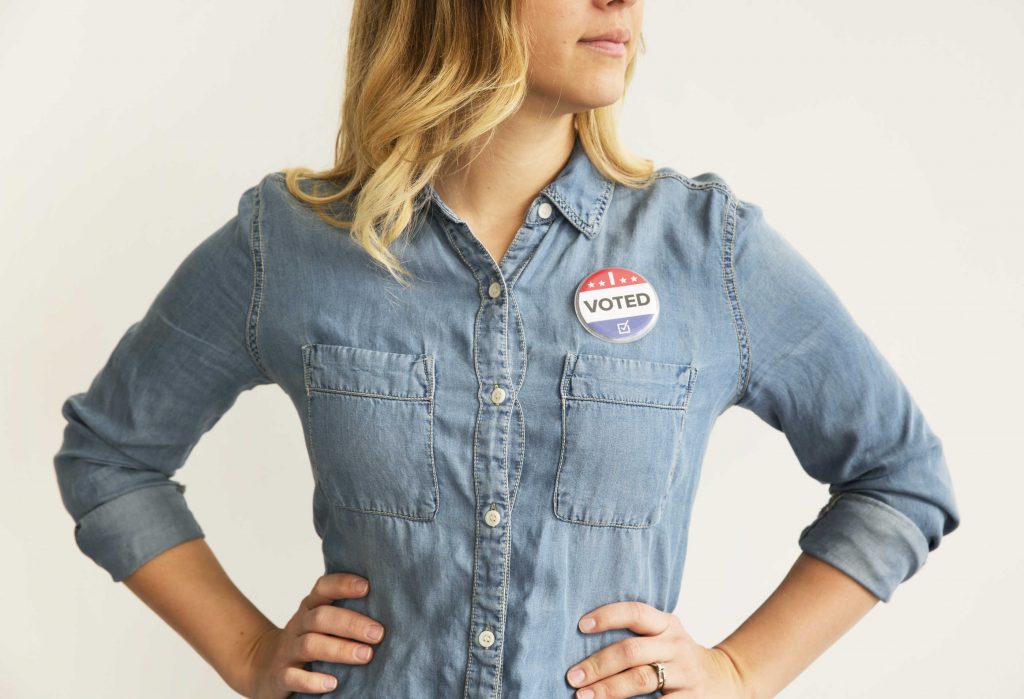With the presidential election behind us and the inauguration today, I’ve spent a big chunk of the last few months thinking about citizenship. I became an American citizen last summer, after spending twenty years in the U.S. as a permanent resident. I love this country despite its many problems, and I’m passionate about living up to the internal promise I made on my naturalization day: to serve and help better this nation, so that it can hold up to its promises of “liberty and justice for all” [emphasis added]. Especially with a new president coming in, and during a contentious and challenging time for our nation, it’s more important than ever to get involved and stand up for what’s right.
How to Be an Engaged Citizen in Politics

Call your representatives
If you want your congressmen to listen to you, one of the best ways to get your message across is to call your representatives (find out why, here). I often use this sheet for prompts and scripts to call my representatives, but you can (and should!) also reflect on what really matters to you and why. You can find contact information for your U.S. elected officials here.
- Why calling your representatives makes a difference (see the original tweets here)
- A call sheet with example scripts and contact information
- How to contact your elected officials
Get involved in local politics
Elections don’t just happen every four years. An important way to make sure that your political opinions are represented is to get involved in local politics, either by assisting on a campaign for your senator or representative, or by getting involved yourself. If you’re still in college, you can get involved in your local chapter of College Democrats or College Republicans.
- How to get involved in local politics
- How to get involved with your local political party
- For students: College Democrats
- For students: College Republicans
Vote
Though the 2016 election is behind us, there are elections for different representative positions every two years. If you’re an American citizen and meet these requirements, you are eligible to vote in your next election. You can register here.
- Requirements for voting eligibility
- Register to vote
- Change or update voter registration information
- See upcoming elections here
Uphold just laws
As a resident of the United States, it’s your duty to uphold and follow the just laws of this country. You can read more about American laws and protections for citizens by reading the Constitution, which sets up the American government, and the Bill of Rights, which establishes basic rights for American citizens.
Protest and participate in civil disobedience for unjust laws
Civil disobedience means peacefully and non-violently choosing not to uphold unjust laws. This is often done in a symbolic way, because the purpose is to protest a specific law rather than to protest the law as a whole. Examples of people who practiced civil disobedience to achieve justice are Dr. Martin Luther King, Jr., and Mahatma Gandhi. You can learn more about civil disobedience here. I personally also recommend reading King’s Letter from Birmingham Jail, where he talks about just and unjust laws.
Identify and stick to your values
No matter who you are, it’s easy to be swayed by political rhetoric and the times we live in. I challenge you, before times may get tough, to write a “mission statement” of sorts that identifies your values, your story, and the standards you have for yourself and others. Write down things that you would never do or believe, as well as the beliefs that guide you and your behavior. Hold on to that. Don’t compromise.
How to Be an Engaged Citizen Through Education

Read the news
Staying informed is vital to being an engaged citizen! I recommend getting a subscription to a newspaper you trust, and subscribing to their “daily briefing” or round-up newsletter, if they have one. I like to subscribe to both American and international newspapers so I also stay up-to-date on international news. Personally, I subscribe to the New York Times, the BBC, and the NRC (a Dutch news service). You could also consider the Washington Post, the Wall Street Journal, or local papers.
Support local news
Local newspapers often engage in investigative reporting that larger newspapers later pick up, which means that a lot of important local stories, especially regarding your local representatives, will come up in local before national papers. At the same time, these smaller newspapers often have a hard time keeping up with costs in a way that major papers don’t. You can conduct a Google search for “newspaper” and the name of your town or nearest city to find your local paper.
Read and learn from voices other than your own
Newspapers and TV channels often feature content from the same group of people, which means that many voices are regularly underrepresented in news. It’s important to listen to these voices, even if you don’t agree with them, to make that you are informed and not staying in an echo chamber. Reading news and articles from people who have different political opinions to yours is a great way to do this, and another is to read news that targets audiences other than you; for example, I follow several Republicans on Twitter even though I lean left, and I check websites like The Root and Latina Feminista even though I am not in their demographic. You can find these kinds of sources by asking around (for example, asking friends from a different political party which sites they check or who they follow online), or by conducting online searches.
Study history
One of the most important reasons to study history to keep from repeating the past. Having some basic knowledge of history is a great way to make sure that you can contextualize news and current events, and also just important for citizenship. There are many great, free resources online for learning history; I really like Crash Course.
Read foundational American documents
Studying history helps us contextualize current events and prevent future mistakes; studying civics helps us be better, more active, and more engaged citizens. If you’ve taken civics classes in high school or college, you’ve probably read bits and pieces of these documents before, but it’s never a bad idea to revisit them. Do your own research on which documents are important for you to read; here’s a starting point.
- The Declaration of Independence
- The Constitution
- The Bill of Rights
- The Emancipation Proclamation
- The 13th, 14th, 15th, and 19th Amendments
How to Be an Engaged Citizen in Your Community

Get a library card
Reading is so important, and so is supporting your local library, which makes reading free and accessible to your community. Signing up for a library card is free and easy. You can find your local library here, by clicking on your state in the box above the navigation bar.
Join a museum
Museums are another great resource for your community. Whether you’re interested in art, music, history, or the natural world, your state or nearest city likely has museums to help you explore your interests. See if there are museums near you and become a member to support the critical work they do in educating and enriching the community.
Join a cultural or religious organization
My church gives me a lot of meaning and community when I’m home, and I’m eager to find a new church community right when I move. Whatever your religious orientation or cultural interest, there are probably places of worship or cultural organizations that can provide you the same community and meaning. Your library is actually a great place to go to learn about these; they often have directories of local organizations. Alternatively, you can ask your friends or local members of your community.
Support a cause that matters to you
Cause-based organizations are also a great way to be engaged and better your community on a broader scale. You probably already know a few causes that are important to you, for example, awareness campaigns, illness prevention fundraisers, or a social justice organization. Getting involved with these on a local or national level is another great way to better your community and world.
Volunteer in your community
Volunteering is another great way to be an engaged citizen and get involved in your community. You can:
- Volunteer at a soup kitchen – find a local food pantry here
- Collect canned goods for a food drive
- Host a fundraiser for girls’ education
- Combat food insecurity by volunteering at a sustainable food center
- Volunteer with children living with life-threatening illness
- Volunteer to help veterans
- Organize or participate in a local Habitat for Humanity build
- Fundraise to cure MS in an MS Run
Donate blood
Blood banks often run low, especially on blood from rarer blood types. By donating blood, you can help save a life. Find local blood drives here.
Be an Organ Donor
You could save someone’s life by being an organ donor. You can sign up when you get your driver’s license, or by visiting OrganDonor.gov.
Learn First Aid, CPR, and AED
Being equipped in case of an emergency is another way to save a life. You can get First Aid certified to learn to treat someone in an emergency before professional help arrives, CPR certified to know how to give someone the Heimlich maneuver in case they are choking, and AED certified so you can administer a defibrillator. Find a local training session through the Red Cross.
These are just a few ways to get involved in your community and be an active and engaged citizen. I’d love to hear from you in the comments: how do you practice good citizenship?






This is really awesome, Sara! I love how in-depth this is.
I love this Sara! I’ll be sharing it on Twitter today!
-Anna | http://www.fivefootandfabulous.com
Thank you Anna! I’m so grateful you’ll be sharing!
Love this post, and of course it is so relevant today!
xx, Jamie
So many great way to be an engaged citizen! I think everyone should do at least one of these!
This is so great, Sara! A lot of these are so important.
Awesome post! Thanks for writing and sharing something like this!
These are some great ideas and I couldn’t agree and encourage enough, young adults committing to become engaged citizens. xoxo
This is such an important post! I’ve only done a few of these, but thanks for the other suggestions.
Alix | http://www.apintsizedlifeblog.com
I love this, especially today! thanks for including this, it’s such a great resource for people. Pinning to save for later! (and call your reps everyone)
These are great tips. It’s really important today to have our voices heard.
You are simply amazing! This should be required reading for everyone. So in-depth and such good information. Kudos to you for producing such a thought provoking piece. Most definitely saving and sharing.
Really great ideas, you have so so so many options that there is something for everyone!
Your post was so thorough! I loved it! A lot of people overlook local politics but those actually might be the most important! And I love that you included volunteering, donating blood, and basically supporting organizations in your community. That’s so important!
Sara, I’m having a big blog-reading catchup this morning and though this was posted a couple of weeks ago (and a lot has happened since then…) this is the most innovative, informative and practical article (on a blog or otherwise) I’ve seen in response to the election. Although I’m in the UK rather than the US we have our own issues going on and the vast majority of these methods are transferrable. I think at this point in history people are feeling so stuck as to how they personally can help, and this leads to the assumption that there’s nothing us ordinary citizens can do which in turn leads to no action whatsoever. As you’ve proved here, that’s the wrong attitude – and an unproductive one. Thanks so much for this post.
Lx | Lightly We Go